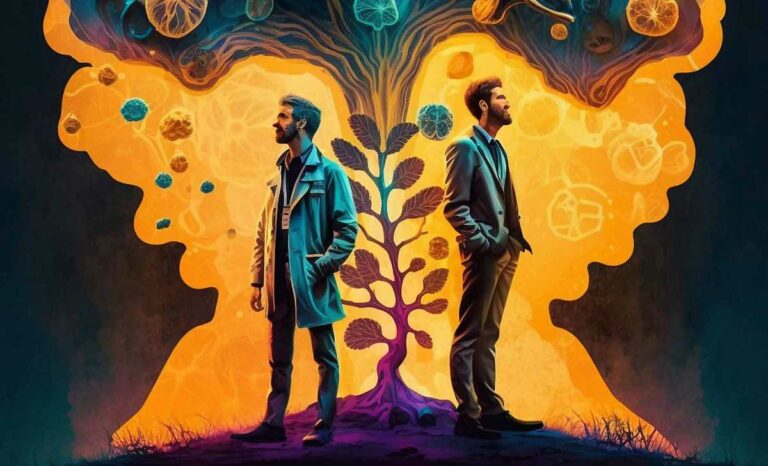As emerging research continues to inspire a new generation of psychedelic activists, some are growing curious about the true necessity for professional psychedelic facilitation. We read trip reports about life-changing psychedelic retreats and guided experiences, but what about self-guided psychedelic journeys?
What’s the benefit in connecting with a facilitator? Can we reap these benefits without the assistance of a psychedelic guide? After all, the 60’s psychedelic era was founded by lone journeyers who recruited their friends and family to tripsit for their experiences. Should this practice be carried over into the 21st century psychedelic revival?
Today we’ll answer all of these questions. We’ll explore the understandable instinct to venture through these altered states of consciousness with the people closest to us, but we’ll also propose a few points that should be properly considered before deciding to swap professional guidance for peer support.
What is The Role of a Psychedelic Guide?
We can’t answer our primary question without first understanding the role of a psychedelic guide. What do their services involve and how does it benefit not only our psychedelic experience, but also our larger healing journey?
In the simplest sense, a guide or facilitator makes your psychedelic experience easier. This is not to say that they can stunt a bad trip or lessen the pain of your internal suffering. Rather, a psychedelic facilitator helps you to prepare for the experience, surrender to the journey, and integrate your findings.
Even before the preparation stage begins, a psychedelic guide conducts a health screening to ensure that this is an appropriate treatment option for your current circumstances. They’ll take your medical and family history into account, while also examining your mental and physical wellness.
Sometimes, a facilitator may decide that a client isn’t quite ready for a psychedelic experience. There are several reasons for this. It’s not uncommon for a facilitator to suggest that a client postpone their psychedelic experience, especially if the client’s current life circumstances are too unstable or emotionally upheaved.
Here, we find the first benefit in hiring a psychedelic guide. Psychedelic experiences are known for amplifying our mental states. Thus, if someone is in the midst of or just moving past a highly traumatizing event, a psychedelic journey may cause more harm than healing.
A lot of prospective journeyers have a difficult time discerning if the magnitude of their current issues should warrant the postponing of their psychedelic experience. A psychedelic guide can help you make a more informed decision by considering all of the factors at play, including your emotional flexibility and cognitive resilience.
Once you’re deemed as a healthy candidate for psychedelic treatment, you’ll step into the preparation stage. Here, your facilitator will demonstrate an interest in your life, in the matters that are most pressing to you, your emotional state, and in the quality of your current relationships.
They use this information to attain a better sense of your goals, to gauge where you are right now, and to understand the mental blocks inhibiting your personal transformation and healing. A facilitator serves almost as a mirror to your healing. What you reflect unto them, they will reflect unto you, in an effort to disambiguate your intentions for the experience.
As our clients move through the intention-setting process, they sometimes find it difficult to narrow their intentions down. They may have a handful of issues they’re hoping to address in the psychedelic experience. Part of a facilitator’s job is to help their clients make their intentions more succinct by identifying common roots across their conflicts.
The preparation phase is also where your guide equips you with the knowledge they’ve acquired on psychedelic experiences, in order to help manage your expectations for the journey. A psychedelic experience is unpredictable by nature, but a guide’s ample field work helps them to recognize the themes that permeate most journeys.
These themes involve emotional challenges, mental blockages, visual and sensory patterns, etc. Journeyers who go in without the knowledge that certain events may occur and without the tools to move through those events, like an ego dissolution, often experience severe and potentially avoidable discomfort.
Of course, your guide will help you decide on an appropriate dosage and ceremonial environment. During your journey, guides hold a space that’s conducive to your comfort and healing. They observe your energy and behaviors to better understand how they can be of support.
A guided psychedelic journey is very different from talk therapy. For example, we have clients who remain silent for almost the entirety of their journey, while others process by verbalizing what’s going on internally. Your guide will adapt to your present needs and meet you exactly where you are.
In a psychedelic journey, it’s almost as if you are borrowing the nervous system of your guide. Your guide has done such extensive inner work that they are able to remain emotionally and energetically stable, both for themselves and for you.
This level of presence cannot be lexically translated, but is whole heartedly sensed by the journeyer as a feeling of trust and comfort in surrendering to the experience. A guide’s extensive experience with psychedelic medicine makes them highly qualified to help you move through the challenging parts of your journey.
For many, a psychedelic experience is not smooth sailing all the way through. Often, parts of the experience will involve the surfacing of repressed emotions. In many cases, this can feel very overwhelming for a journeyer. Because guides have many personal emotional regulation practices, they’re able to soothe your mind and body using similar techniques.
After your journey is over, a guide will take you through integration sessions. This is where you process the experience and come to a clearer understanding of how the journey can be productively applied to your day-to-day life.
Integration is one of the most vital processes for ensuring a safe and healthy transition between different states of consciousness. In many cases, a psychedelic experience makes great shifts in the perspectives and personal beliefs of journeyers.
This can cause us to feel disconnected from some personal relationships because we no longer identify or support our old points of view or habits. A facilitator helps you navigate the effects that a psychedelic experience may have on your relationships with others and with yourself.
Can my Friend, Spouse, or Relative Tripsit Me?
Once in a while, prospective clients will ask us this question. It’s a completely valid inquiry seeing as it’s natural for humans to feel more comfort around people they’ve known for a long time. Vulnerable communication and relation is a natural product of most long standing friendships and relationships.
Having a close friend or family member tripsit you may feel the most comfortable, in theory. However, the truth is that it can be extremely challenging to fully surrender to such an experience in the presence of our loved ones.
In a psychedelic state we embody the most raw and unfiltered versions of ourselves. How far can you truly allow yourself to surrender in the presence of people you personally know? We feel much less judgment in the presence of people we do not have personal associations with.
Thus, if a journeyer is in the presence of someone they know while in such an altered state, they’re much more likely to feel conscious or unconscious pressure to maintain the persona they project around that person, to “hold themselves together”.
Many people are seeking these journeys to address their depression, anxiety, or PTSD. When we think about the depth of these emotional states and the level of emotional suppression they’ve likely caused, we can understand why having a professional present is likely the most therapeutic option.
A psychedelic guide has knowledge and experience regarding safety, energetic presence, and crisis management, that family members and friends likely do not have. Another factor to consider is that in these states, we are very energetically in-tune with our environment and the people around us.
Someone who doesn’t have extensive practice regulating their own nervous system, could unknowingly emit energies of fear, worry, or judgment. These feelings are sensed by the journeyer and in such cases, it could very likely cause the journeyer to embody those same emotions.
Aside from this, a professional psychedelic guide has the tools to help you navigate preparation and integration processes, while friends and family likely do not. Though there’s always the option to have a peer tripsit you while going through preparation and integration phases with a professional guide.
The downside to this though, is that the guide won’t have first-hand knowledge of what really occurred during your journey. They’ll be counting on your recollection of events. If a guide is present during the journey, they may help you interpret the event from not only your perspective, but from what they themselves witnessed.
Is it Really Necessary to Hire a Psychedelic Guide?
Are psychedelic guides necessary for having a therapeutic psychedelic experience? The short answer is no, because your inner healer is the primary cause for your personal change. Even with all of the help in the world, if we’re not willing to put in the mental effort to reinforce new ways of thinking and behaving, we will fail to see any real change.
Your brain is the only facility with access to all of the traumas, feelings, and thoughts that afflict your present circumstances. No amount of external influence can help us move through our internal conflicts unless we’re willing to sit in the discomfort of processing them.
Plenty of people have journeyed on their own with great success in learning more about themselves and about the deeper truths of existence. However, plenty of people have also borne the consequences of journeying without proper support.
When we have an experience that shifts our state of consciousness so greatly, we can be left with a deep feeling of unresolvement. We have all of this new information, but we don’t know what to do with it. Sometimes, we don’t even know who to share it with because the people we normally surround ourselves with, don’t know themselves enough to understand truths beyond their own.
It’s not necessary to hire a psychedelic guide in the same way that it’s not necessary to wear a seatbelt when driving, but it sure does help ensure stability, safety, and ease of mind. Connecting with a facilitator is the most supported option, especially for those seeking to address major life changes or pervasive mental health conditions.
Explore How it Feels to be Connected
If you’re looking to embark on your own therapeutic psychedelic journey, we empower you to book a consultation with us. Psychedelic journeys should be approached with intentionality and deep respect, and we’re here to make your communion with these ancient medicines more comfortable and effective.
Of course, you may very well have many lingering questions still on your mind. If so, check out our resources page for more informative articles on all-things-psychedelic. Well friends, that’s all we have for today. As always, safe and mindful journeying!



